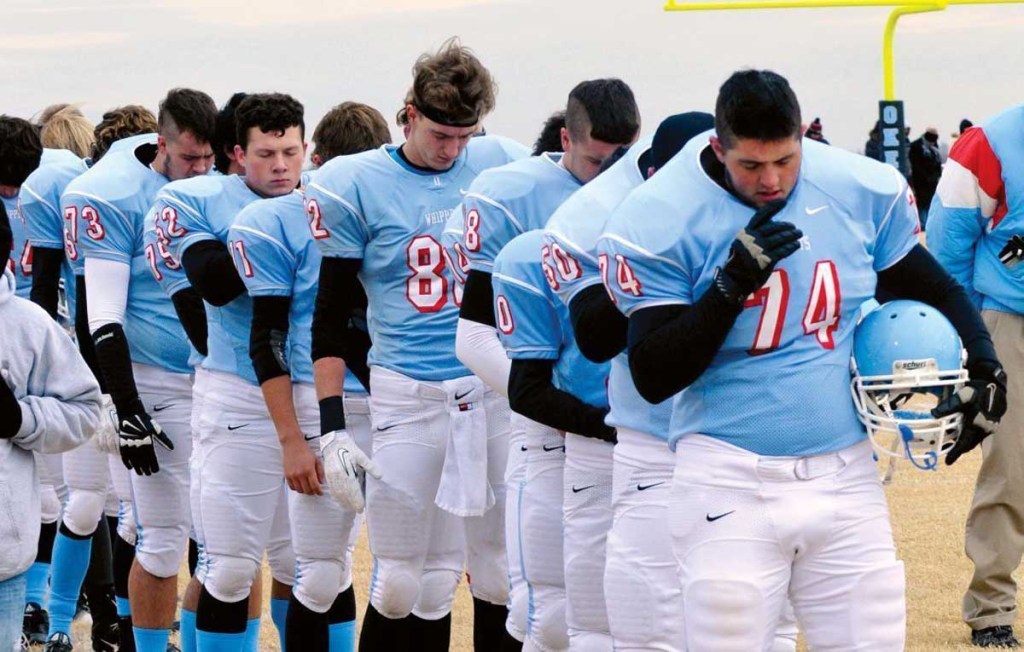Fight over school prayer ignites in Oklahoma
Published 4:21 pm Monday, June 29, 2015

- Members of the Okeene High School teams during a prayer prior to the playoff game against Cashion November 23, 2013. ( Photo by BILLY HEFTON)
ENID, Okla. — Oklahoma’s high school athletics governing body has reignited a fierce debate on the subject of prayer at football games, prompting state representatives to vow a challenge the organization’s controversial policy.
When the Oklahoma Secondary School Activities Association met last month, it intended to simply clarify the wording of its existing policy, which prohibits student-led prayer over the public address system at high school football games, said OSSAA executive director Ed Sheakley.
“Never, ever were we not going to allow students to pray, but we are going to adhere to the Supreme Court and respect others,” Sheakley said.
Sheakley said the organization’s policy is in compliance with past Supreme Court rulings that he says have held that student-led prayers cannot be recited over the public address system at high school football games under the Establishment Clause in the First Amendment of the U.S. Constitution. Sheakley said students are still allowed to pray on their own.
That’s not likely to satisfy Rep. Bobby Cleveland (R-Slaughterville) or his fellow legislators who have joined him in condemning the OSSAA’s position on the matter. Cleveland claims he has “20-25” legislators who are willing to join him in opposition.
“All we’re saying, as representatives, is if the school has been having prayer over the P.A. system at their games all season long, they should be allowed to continue,” Cleveland said. “If you do it correctly, then you can do it over the P.A. system, the courts have allowed that. For example, you could have a student chosen by the student body come up and make an announcement before the game and that could include a brief prayer. The courts have supported that.”
Sheakley didn’t agree.
“They need to go and read the decision,” Sheakley said in response to Cleveland’s assertion.
There have been well-publicized challenges to P.A. system prayers on the collegiate level that didn’t rise to the level of court action. An organization that has been at the forefront of opposition has been the Freedom From Religion Foundation, which has never been bashful about launching a media campaign, but with a spotty record of success.
The group tried in 2012 to get the University of Tennessee to cease having its public address announcer ask those in attendance to stand for a pregame invocation delivered by a member of the clergy. The school didn’t back down, informing the group that a decision in the Sixth Circuit Court of Appeals held that “non-sectarian prayer did not violate the First Amendment.”
The FFRF did not pursue the matter further at Tennessee, but it continues to challenge others. Earlier this month, the group sent a complaint to the University of Toledo after it found a 2012 YouTube video of Rockets head football coach Matt Campbell leading the team in a pregame prayer, contending leading the team in prayer was a “flagrant violation of the First Amendment.”
Unlike Tennessee, Toledo quickly backed down and Campbell has since issued a statement that he no longer will lead the team in prayer.
Pregame prayers have long been a tradition in many Oklahoma communities and throughout the region. That includes Texas, where Enid (Oklahoma) High School football coach Steve Hayes spent the preceding 11 years as head coach at Trinity Christian Academy.
“We did a prayer before each game where the dads prayed on the field with their sons and it was a cool deal,” Hayes said. “We never had a complaint. The only feedback I ever got was ‘I wish we could do that at our school.’ The interaction between father and son was special.”
Sheakley said OSSAA has not set any penalty or procedure if a school doesn’t abide by the rule.
“We aren’t going to run to the booth and make them stop or make them forfeit a game,” he said. “We will probably just counsel them on our rules. It’s the school’s call (on prayer), during the regular season, but during the postseason we need to be in compliance (with the Supreme Court).”
Ruthenberg writes for The Enid (Okla.) News.





